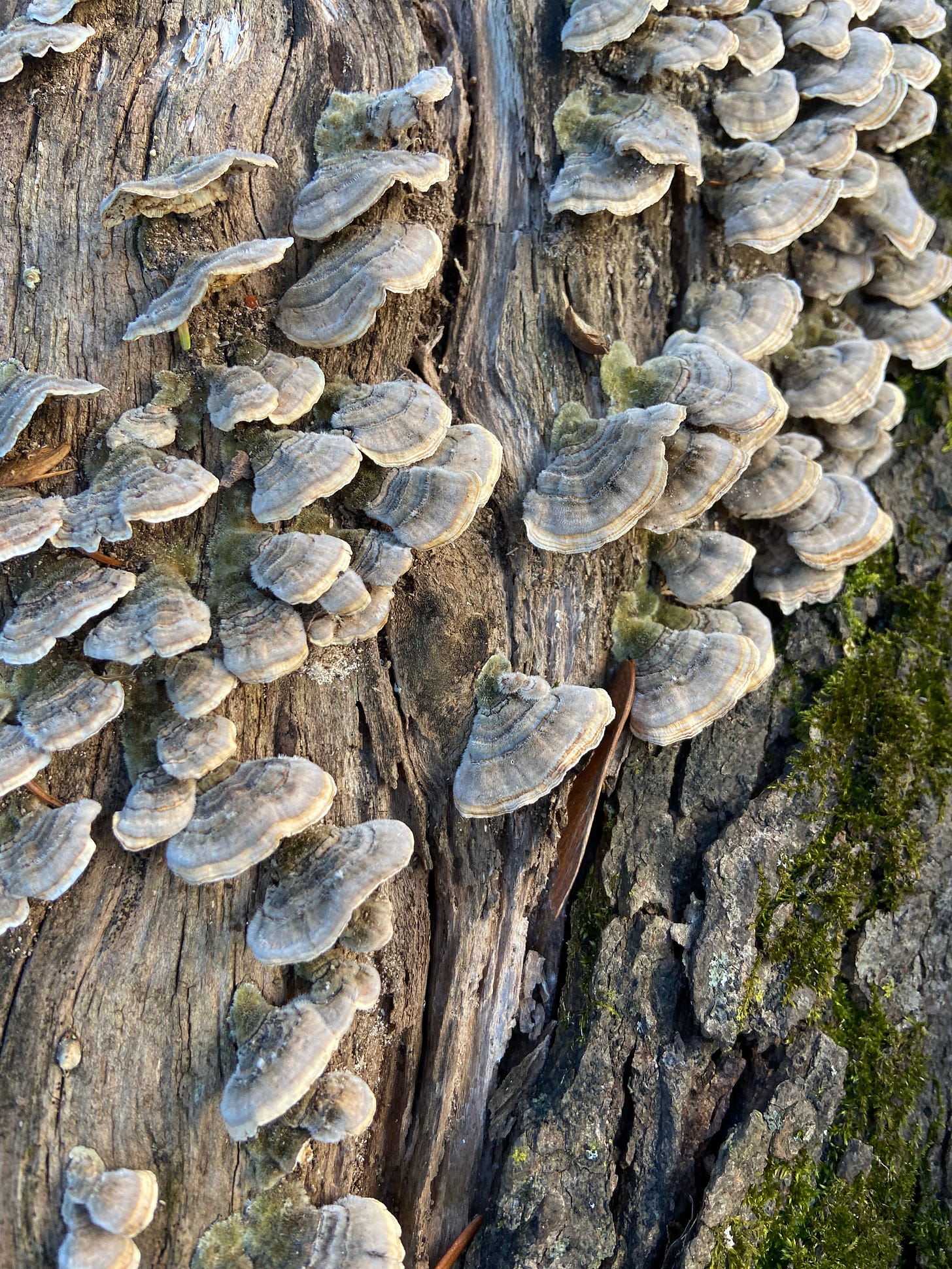IMAGE ID: Running my fingers over fuzzy moss. 10/10 recommend.
Hello you, Adreanna here for this week’s dispatch of The Laundry —
This winter, the weather has been unusually warm. Too warm, in my opinion, for winter in the Northeast. I’ll be the first to admit that I enjoy a 50 degree day in January. It’s lovely. It’s temperate. But I think it confuses nature. The lilac and the quince sprouted early, and their buds shriveled up in a cold snap. Things with wings have been buzzing past me on unseasonal afternoons. “It’s too soon,” I tell them, “The days haven’t finished freezing.” But they don’t speak English, I don’t speak Fly, so we both traipse around in the warm afternoon sun, only one of us hesitating to enjoy it. Maybe that makes me the confused one?
When I lead a meditation that works with mindfulness of the body, I will often direct our attention to the rhythmic quality of the breath. The breath has a clockwork, a continuity that we can rely on and relax into. Inhale folds into exhale and exhale rises to inhale. Sometimes in my talks I will equate the rhythmic quality of the breath to the rhythmic quality of the seasons. The naturally occurring seasons, like the naturally occurring breath, both root us in time and space. Recently, I’ve been holding back on this. I’m not so sure that saying something is as clockwork as the seasons is quite as reliable anymore.
Earlier this week I was folding laundry and my eyes caught someone small clinging to the window. A bee, no bigger than an inch. It was huddled and still, gripping against the glass. I watched it as I folded Ruby’s footie pajamas into the size of pocket squares. The bee didn’t move. I imagine it froze to death the night before, while seeking refuge against the warm glass of the window.
My heart cracked in half and I openly sobbed for all of the vulnerable beings seeking safety in impossible situations. Whoever started the whisper campaign that compassion is warm and fuzzy was only telling half of the truth. Sometimes it can hit like a shank to the ribs while you’re folding your baby’s clothes.
Psycoterratic Syndromes is an umbrella term that includes a number of mental states and emotions that are linked to witnessing the degradation of the earth. Glenn Albrecht, the professor who coined the term, has described these states as “Earth feelings,” though in my experience it’s been a bit more like feeling the Earth — in the same way that compassion springs from allowing oneself to feel the pain of others. Eco-grief falls under this umbrella. So does climate anxiety and guilt.
Solastagia is one of these “syndromes” (built from the words solace and nostalgia) that points to the feeling of homesickness one might experience without ever leaving one’s home, but instead watching one’s home environment begin to unravel in place. This might be experienced more quickly through bombing, drilling, or industrial pollution in the waterways. This might be experienced more slowly: like a 50 degree day in January and the shriveling buds that emerged too soon.
Having new language for these “Earth feelings” doesn’t offer a solution, but it does make me feel understood and a little less alone in the experience of feeling the Earth. I frequently wonder what role meditation has to play in helping to digest our Earth feelings, as I imagine these feelings will only increase. And perhaps it’s possible that digesting our Earth feelings might bring about more skillful actions?
A number of years ago, when the political climate in the U.S. was at a fever pitch, Buddhist Peace Fellowship posted a bit of guidance for meditation practitioners and teachers on how to practice Loving-Kindness in a way that was trauma-informed and respected the heat of the moment. (I’ve searched high and low for this particular article, but it seems to have been removed?)
If it felt a little too charged to practice extending Loving-Kindness towards people, they advised practicing Loving-Kindness towards nature instead. I think about this advice a lot, and I’ve been working with it ever since.
There are natural environments that are beautiful and sacred to me, that make me feel a palpable connection to what is divine. There are environments, like weedy roadside medians, that I find neutral. I hardly notice them at all. And there are natural environments that I find downright ugly or disturbing, where I would prefer not to spend my time. My heart goes out to these places most of all. I can only assume that (much like people) these places originated as natural beauty and were made ugly through abuse and neglect.
The editor-in-chief of Atmos magazine, Willow Defebaugh, recently published a gorgeous collection of her essays entitled The Overview: Meditations on Nature for a World in Transition. It’s made a permanent home on our coffee table and just like Atmos itself, has been a salve to my psycoterratic states. One essay in particular, called “Breaking The Mold” is about the small but mighty ritual of composting. She writes:
“Of course, moments arise when habit and languor lure me to throw away my food waste, but each time that temptation presents itself, I have started asking this question: who am I to deny your return to the earth?”
It’s a question that’s been ringing in my mind like a song with a catchy hook.
I think of this question when I chop up my own scraps for the compost. I think of this question when things with wings buzz past me on unseasonably warm days, living in the moment in the sun. I think of this when my heart feels weighted by solastagia and Earth feelings, and tenderness for its most vulnerable beings. “Who am I to deny your return to the earth?” I’ve been saying to the weight of my heart. And then I catch the clockwork of my breath— and let myself simply feel it.









Thank you as always Adreanna. Your essay touched my heart. I write children's books on endangered species, a bee, a monarch butterfly, an orphaned elephant, a pangolin donating any royalties to organizations that protect them. I am a sucker for street dogs in Taiwan, a destroyed habitat, a child going hungry. So I am grateful for your offer of a way to accept moments of heartache along with moments of joy as part of the natural rhythms of life. From a flower that buds too early to a Texas wildfire that destroys millions of acres you teach that we can't control the seasons or nature but we can control our breath and approach each day finding ways to make a difference while at the same time stay balanced and compassionate.
As an organic farmer people, I find people often lament to me about food waste and while that is a very broad and nuanced topic, I find often I say this very thing! I tell them that any excess produce or food waste we have on our farm is never truly waste if we return it to the earth. Thank you and Lodro for your posts, I appreciate them weekly!